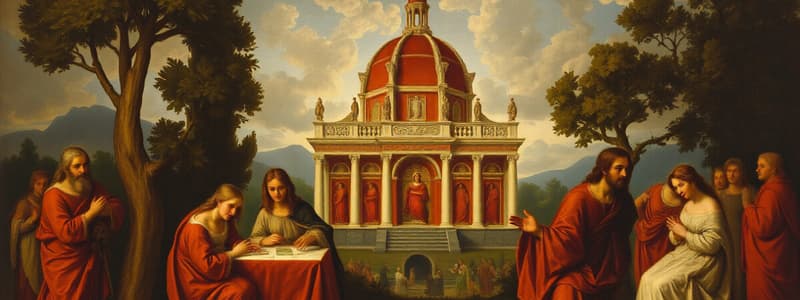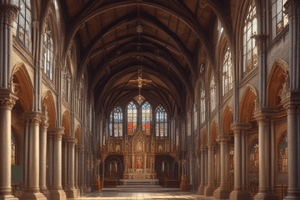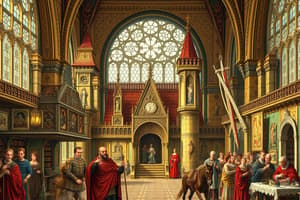Podcast
Questions and Answers
What role did Christianity play in the Western Roman Empire?
What role did Christianity play in the Western Roman Empire?
- It became the official state religion under Emperor Constantine. (correct)
- It caused political fragmentation.
- It encouraged the adoption of Roman law.
- It diminished the influence of the Byzantine Empire.
Which statement about the Byzantine Empire is true?
Which statement about the Byzantine Empire is true?
- It lasted for only a few decades after the Western Roman Empire fell.
- It utilized feudalism as its primary social structure.
- It maintained the Eastern Orthodox Christianity for nearly a millennium. (correct)
- It supported Islamic expansion in Europe.
What was a result of the Crusades in Western Europe?
What was a result of the Crusades in Western Europe?
- They resulted in the establishment of a unified European government.
- They caused the end of feudalism.
- They connected Europeans to broader trade networks despite military failures. (correct)
- They led to the immediate conversion of Muslims to Christianity.
What characterized feudalism as a political organization in Europe?
What characterized feudalism as a political organization in Europe?
How did the Kievan Rus relate to Eastern Orthodoxy?
How did the Kievan Rus relate to Eastern Orthodoxy?
What led to the marginalization of Jews in European societies during this period?
What led to the marginalization of Jews in European societies during this period?
What factor contributed to the centralization of power among monarchs in Europe?
What factor contributed to the centralization of power among monarchs in Europe?
What was a significant outcome of the fall of the Byzantine Empire?
What was a significant outcome of the fall of the Byzantine Empire?
Flashcards are hidden until you start studying
Study Notes
Religion in Europe (1200-1450)
- Christianity became the official state religion of the Roman Empire under Emperor Constantine, promoting unity among Romans.
- The Western Roman Empire fell in 476 CE, while the Eastern Roman Empire, known as the Byzantine Empire, preserved Eastern Orthodox Christianity for nearly a millennium.
- Eastern Orthodox Christianity justified and consolidated the centralized power of Byzantine rulers.
- The Byzantine Empire lost significant territory to Islamic powers before ultimately falling to the Ottoman Empire in 1453, with Constantinople renamed Istanbul.
- The Kievan Rus adopted Eastern Orthodoxy, borrowing from Byzantine culture, church organization, and architecture after the Byzantine collapse.
- In Western Europe, Roman Catholicism remained a unifying force despite political fragmentation; the church hierarchy provided structure across decentralized territories.
- The Crusades, initiated largely by the church, connected Europeans to broader trade networks despite military failures against Muslim powers.
- Islam and Judaism were prominent minority religions, with Muslims occupying the Iberian Peninsula and Jews often marginalized and persecuted within European societies.
Political Organization in Europe
- Europe lacked large empires at the beginning of this period, contrasting with the powerful empires in the Americas, Asia, and the Islamic world.
- Feudalism emerged as the dominant social, political, and economic order, characterized by allegiances between lords and monarchs.
- Land was exchanged for loyalty, creating a network of independently ruled regions bound to powerful lords.
- Minorialism defined the feudal system, with peasants (serfs) tied to the land they worked, receiving protection in exchange for labor.
- Monarchs began to centralize power, shifting authority from nobility through the establishment of large militaries and bureaucracies.
- This emergence of central authority led to competition among monarchs, fueling wars of conquest to expand territories and influence.
Religion in Europe (1200-1450)
- Christianity was established as the official state religion of the Roman Empire under Emperor Constantine, fostering unity among Romans.
- The Western Roman Empire fell in 476 CE, while the Eastern Roman Empire, or Byzantine Empire, upheld Eastern Orthodox Christianity for nearly 1,000 years.
- Eastern Orthodox Christianity supported and reinforced the centralized authority of Byzantine rulers.
- The Byzantine Empire gradually lost significant territories to Islamic forces, culminating in its fall to the Ottoman Empire in 1453, which resulted in Constantinople being renamed Istanbul.
- The Kievan Rus adopted Eastern Orthodoxy after the Byzantine collapse, integrating Byzantine cultural traditions, church hierarchy, and architectural styles.
- In Western Europe, Roman Catholicism served as a unifying element amid political fragmentation, with the church providing organizational structure in decentralized territories.
- The Crusades, spearheaded by the church, facilitated connections between Europeans and broader trade networks despite military setbacks against Muslim powers.
- Minority religions such as Islam and Judaism were significant in Europe, with Muslims primarily located in the Iberian Peninsula and Jews frequently facing marginalization and persecution within societies.
Political Organization in Europe
- Early in this period, Europe was devoid of large empires, in contrast to the powerful empires existing in the Americas, Asia, and the Islamic world.
- Feudalism emerged as the prevailing social, political, and economic system, marked by alliances between lords and monarchs.
- Loyalty was exchanged for land, creating a network of independently governed regions connected to influential lords.
- Serfdom defined feudalism, whereby peasants (serfs) were tied to the land, receiving protection in return for their labor.
- Monarchs initiated centralization efforts, transferring power away from nobility by creating large militaries and bureaucracies.
- The rise of centralized authority instigated competition among monarchs, leading to wars of conquest aimed at territorial expansion and increased influence.
Studying That Suits You
Use AI to generate personalized quizzes and flashcards to suit your learning preferences.




